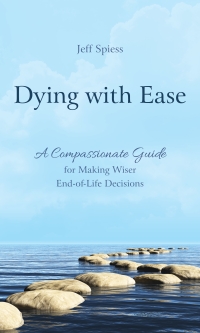The Smirk
 I heard the chuckle dozens of times, saw the smirk over and over. The chuckle was one syllable long, a quick exhalation, between a “huh” and a cough. The smirk was a quick pull at one corner of the mouth, a slight near-wink of the eyelid on the same side, closer to a tic than an expression. They were simultaneous, took less than a second, but spoke volumes.
I heard the chuckle dozens of times, saw the smirk over and over. The chuckle was one syllable long, a quick exhalation, between a “huh” and a cough. The smirk was a quick pull at one corner of the mouth, a slight near-wink of the eyelid on the same side, closer to a tic than an expression. They were simultaneous, took less than a second, but spoke volumes.
They were a reaction to something the smirker had just said. I, as the hospice physician, was having a conversation with a patient, family, or, most often, a family member aside in the hallway. The conversation was a serious one, about life and death, prognosis and survival. I was being asked how long the patient was likely to live, what plans needed to be made, whether the rest of the family should be notified to come home, whether Mom would make it to see tomorrow morning. Trying to defuse the intensity of the moment, someone would say, “Well, I guess we all have to go sometime…(chuckle/smirk)…”
This is an understandable defense. These conversations arouse feelings that we usually keep suppressed. A large part of those feelings come from the obvious source: someone the smirker cares deeply about, someone vital to their life, to who they are, will very soon no longer exist. The threat of the impending deep loss is staring them in the face, unblinking, and that lame but essential joke allows them to briefly surrender in that staring contest, to look away and come back to fight another day.
But there is another, more personal, more threatening reality present. It may not be consciously acknowledged, but it is perceived, pervasive, and persistent, like the unblinking eye of Sauron. It is the reality of death, not only the death of this one that I care about, but also to me. It is Mom this time, but next time it might be me. That is what I saw in the smirk, heard in the chuckle, “Well, I guess we all have to go sometime…(chuckle/smirk)…except me, at least, I hope, not for a very long time.”
Psychologists tell us that children in elementary school try not to talk about fearsome realities because if they don’t think about them, then maybe they won’t happen, and if they do express what they fear, this might cause it to happen. This is normal developmental thinking at that age. But many of us, at least when it comes to the fact of our own mortality, don’t mature much beyond that stage. If we must talk about death, we put it at arm’s length, we try to make it a hypothetical proposition rather than an impending reality. We use euphemisms like “passing” (a better term for exams and kidney stones) or “expiring” (like subscriptions or milk) or “succumbing” (because we don’t really have a clue what that archaic word means).*
But we all really know the bad news, at least at that intellectual level, we all know that we are going to die. Nobody gets out of here alive. That’s just the way it is. But that is also the good news! Sure, we’re going to die, but that was just as true back when we were trying not to think about it. Being honest about it lets us plan for it, certainly, but also, really lets me figure out what it is that scares me about it, allows me to be more comfortable in the hospital room or hallway, and even releases the ability to more honestly laugh about it, to live with it.

